Asbestos Removal Contractors Scranton
Find the best Asbestos Removal in Scranton
Receive multiple Asbestos Abatement quotes for your project today! Compare profiles, reviews, accreditations, portfolio, etc... and choose the best deal.
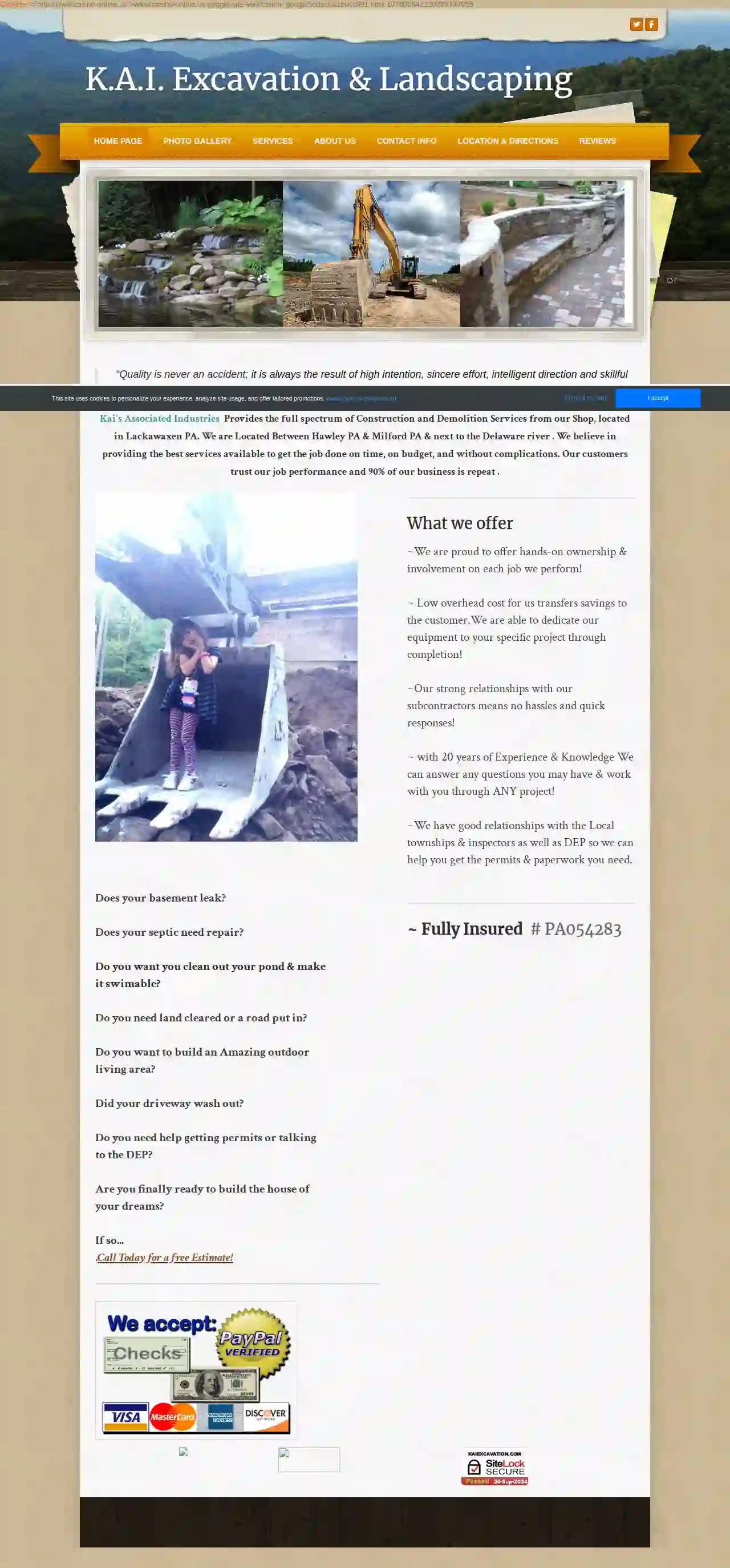
K.A.I. Excavation & Landscaping
4.423 reviewsLackawaxen, USAbout Kai Wicksnes /Owner Operator When did you start your business? I started working in the landscaping /Excavation field right out of High School in 1995. I worked with Heavy Equipment since I was old enough to reach the lever's & Petals. My Best Friend Growing up had a Father in the Excavation business and I learned a lot from him at a very young age. I also came from a long line of hard working men with good work ethics. My dad taught me that learning new trades and learning about the Land was crucial to being a well rounded man. I had a natural proclivity and passion for Excavating & Landscaping since I was a young boy. Before I had my drivers licence neighbors would see me driving my bike with a cart behind it carrying a lawn mower, gas & a rake in tow. Soon I had a small business in the neighborhood and it has grown into what it is today. I have always loved seeing the end result of my work. It gives me great pride to take an area so rough & tumble & make a beautiful waterfall with a pond with free land to run on. What makes you different than other similar businesses in your community? I live in the area that I work ,so I do the best work possible to keep my clients(who are usually my neighbors) happy. I like to drive past a job I did and see kids running in the lawn I created or people sitting around a stone fireplace I built. It is very important to me to continue building a top notch business for my children to someday run. I want Kai's Associated Industries to be known for our great customer service & excellent work. I also have a lot of my own land so I get the majority of my materials right from my property. I am able to REUSE a lot of resources such as tree stumps which we bury until they biodegrade back into the soil. Being very cautious with any land & it's animals, I consider all option's while clearing a large portion of forest. We are a small family business with a big presence With over 20 years of experience & am very knowledgeable about what I do. I am now building a family who is also into landscaping & excavating. From creating landscapes, to operating machinery, to advertising, and book work. I am looking forward to my children working with me & continuing the well established business I poured my heart and soul into. I am a firm Believer that a Family that works together, Stays together . I look forward to see
- Services
- Why Us?
- Gallery
Get Quote
The Busy Beaver Tree Service & Excavation
4.555 reviewsScranton, USPennsylvania’s Trusted Tree Service and Removal As fully insured, licensed, and certified arborists, we pride ourselves on delivering top-notch services. Our expertise covers a wide array of offerings, including tree removal, emergency tree services, commercial plowing, lot clearing, firewood provision, crane services, property maintenance plans, and meticulous tree pruning. At Busy Beaver Tree Service and Excavation, we treat our clients like family, ensuring that their needs are met with the utmost professionalism and care. Our skilled team is adept at handling various tree-related tasks, from routine tree trimming to urgent tree removals. Understanding the potential hazards of damaged trees, we emphasize the importance of relying on certified professionals for all tree services. Count on us for excellence; we are the go-to specialists for tree care and removal throughout Northeast Pennsylvania!
- Services
- Why Us?
- Gallery
Get Quote
TCR Solutions Excavation
58 reviewsScranton, USExcavation Excellence for Your Project's Success TCR Solutions specializes in site work, digging, building pads, septic and sewer, utilities, and large-stacked stone walls. Concrete TCR does concrete of all sorts, including but not limited to: flatwork, patios, stamped concrete, poured foundations, poured footers & foundation walls, driveways, sidewalks, curbs, and parking lots. (*Special requests available upon contact!) Drainage From drain tile and catch basins to sump pumps and finished grading, TCR Solutions provides drainage services of all kinds.
- Services
- Why Us?
- Gallery
Get Quote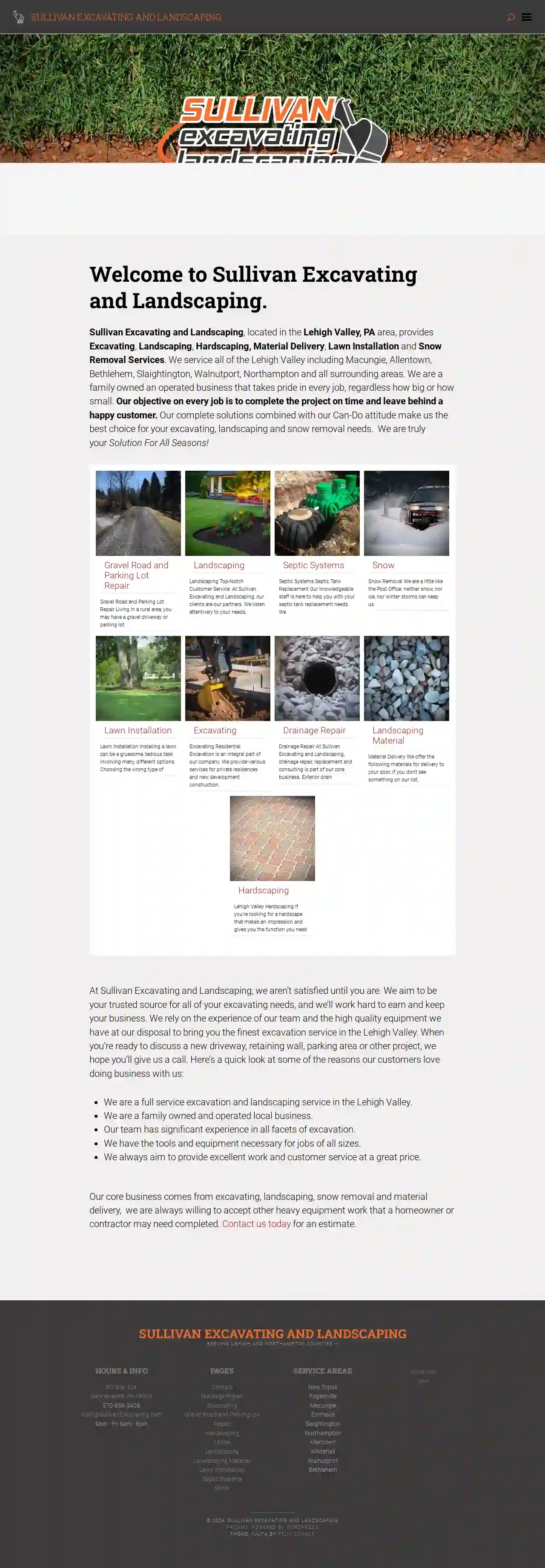
Sullivan Excavating and Landscaping
53 reviewsPO Box 104, Germansville, 18053, USWelcome to Sullivan Excavating and Landscaping. Sullivan Excavating and Landscaping, located in the Lehigh Valley, PA area, provides Excavating, Landscaping, Hardscaping, Material Delivery, Lawn Installation and Snow Removal Services. We service all of the Lehigh Valley including Macungie, Allentown, Bethlehem, Slaightington, Walnutport, Northampton and all surrounding areas. We are a family owned an operated business that takes pride in every job, regardless how big or how small. Our objective on every job is to complete the project on time and leave behind a happy customer. Our complete solutions combined with our Can-Do attitude make us the best choice for your excavating, landscaping and snow removal needs. We are truly your Solution For All Seasons! At Sullivan Excavating and Landscaping, we aren’t satisfied until you are. We aim to be your trusted source for all of your excavating needs, and we’ll work hard to earn and keep your business. We rely on the experience of our team and the high quality equipment we have at our disposal to bring you the finest excavation service in the Lehigh Valley. When you’re ready to discuss a new driveway, retaining wall, parking area or other project, we hope you’ll give us a call. Here’s a quick look at some of the reasons our customers love doing business with us: We are a full service excavation and landscaping service in the Lehigh Valley. We are a family owned and operated local business. Our team has significant experience in all facets of excavation. We have the tools and equipment necessary for jobs of all sizes. We always aim to provide excellent work and customer service at a great price. Our core business comes from excavating, landscaping, snow removal and material delivery, we are always willing to accept other heavy equipment work that a homeowner or contractor may need completed. Contact us today for an estimate.
- Services
- Why Us?
- Gallery
Get Quote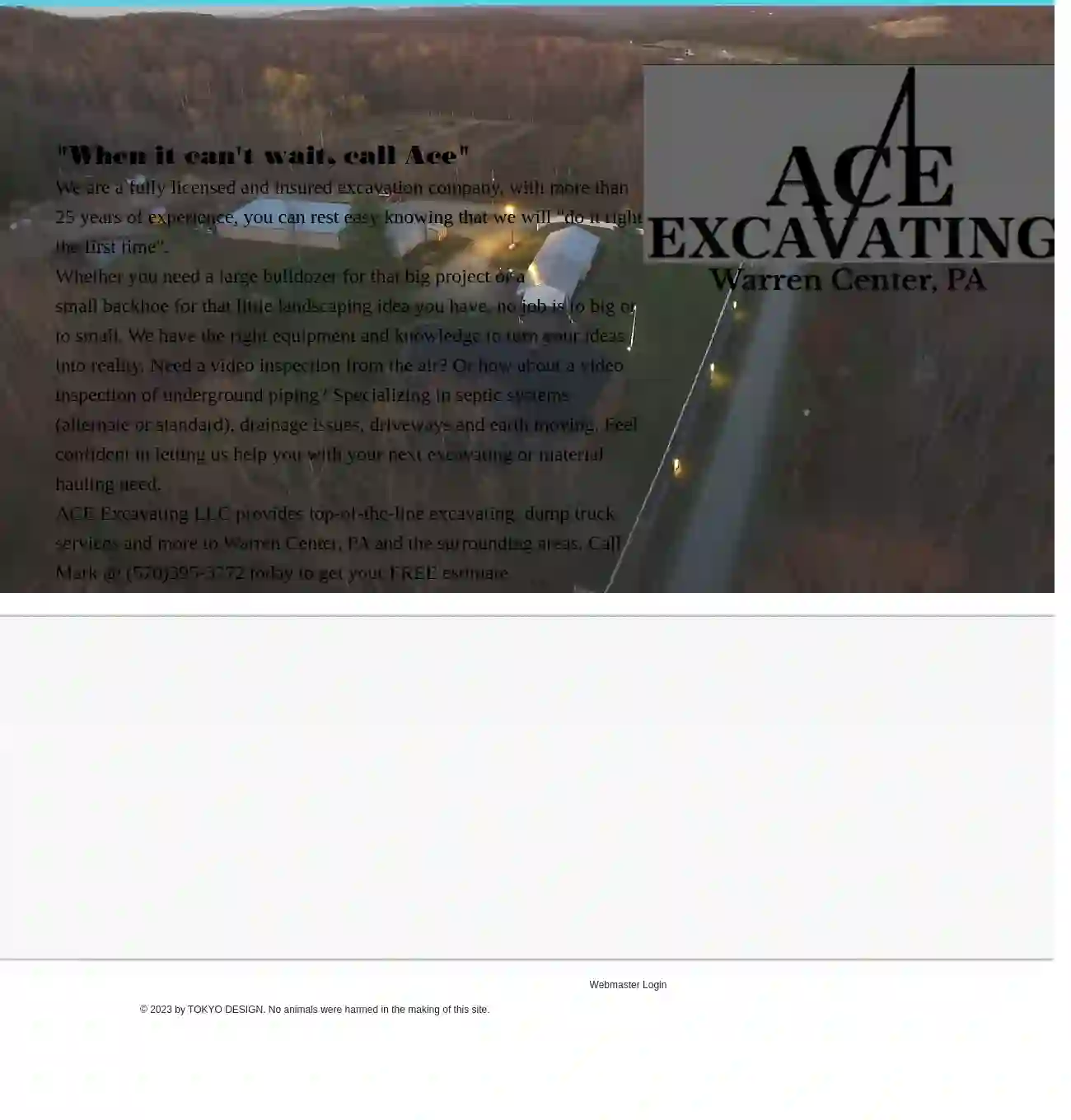
Ace Excavating
52 reviewsWarren Center, USWhen it can't wait, call Ace We are a fully licensed and insured excavation company, with more than 25 years of experience, you can rest easy knowing that we will "do it right the first time". Whether you need a large bulldozer for that big project or a small backhoe for that little landscaping idea you have, no job is to big or to small. We have the right equipment and knowledge to turn your ideas into reality. Need a video inspection from the air? Or how about a video inspection of underground piping? Specializing in septic systems (alternate or standard), drainage issues, driveways and earth moving. Feel confident in letting us help you with your next excavating or material hauling need.
- Services
- Why Us?
- Gallery
Get Quote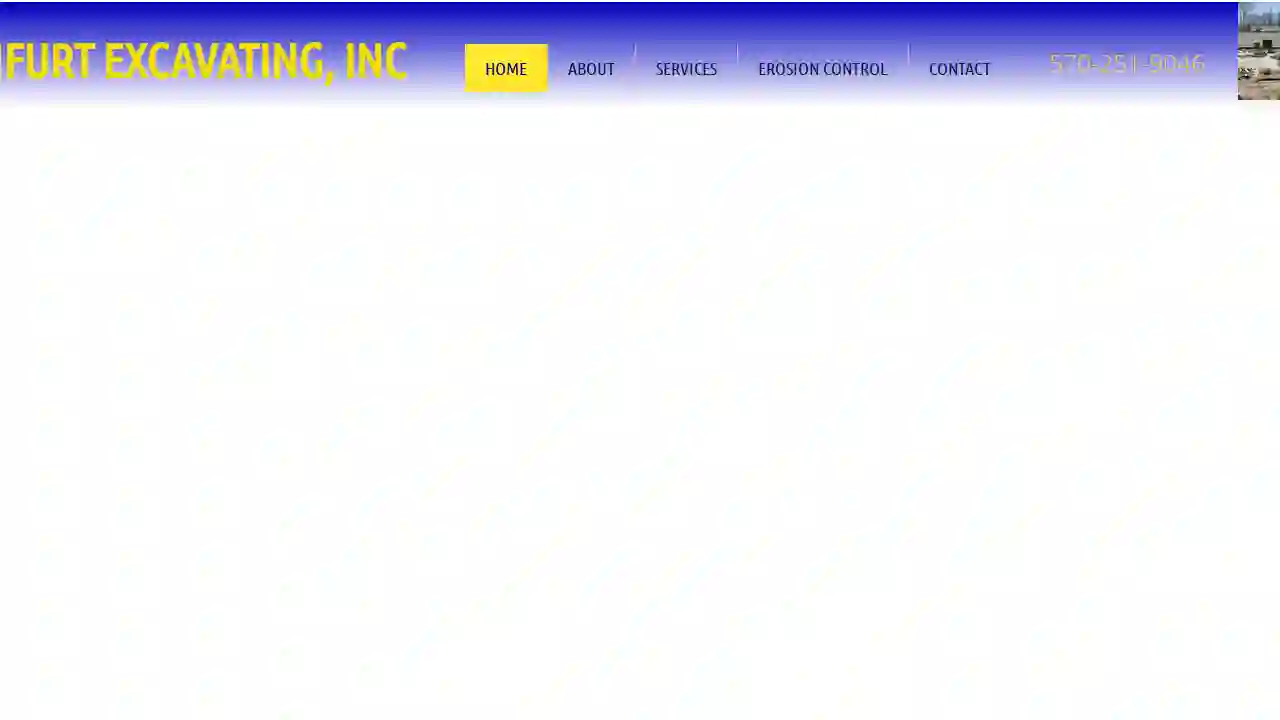
Reinfurt Excavating Inc
53 reviews294 Ski Run Road, 294 Ski Run Rd, Honesdale, 18431, USAbout Reinfurt Excavating Since 2002, Reinfurt Excavating, Inc. has been providing a wide range of excavation services to Honesdale and the surrounding areas. We are an Aqua Pennsylvania approved contractor and are one of the few companies to provide Slinger truck services. Reinfurt Excavating, Inc. is a full-service residential & commercial excavating company located in Honesdale, Pennsylvania, providing excavating services to Wayne, Pike, Lackawanna, Monroe and Luzerne Counties. We are proud to hold membership with [Insert Name of Organization] .
- Services
- Why Us?
- Gallery
Get Quote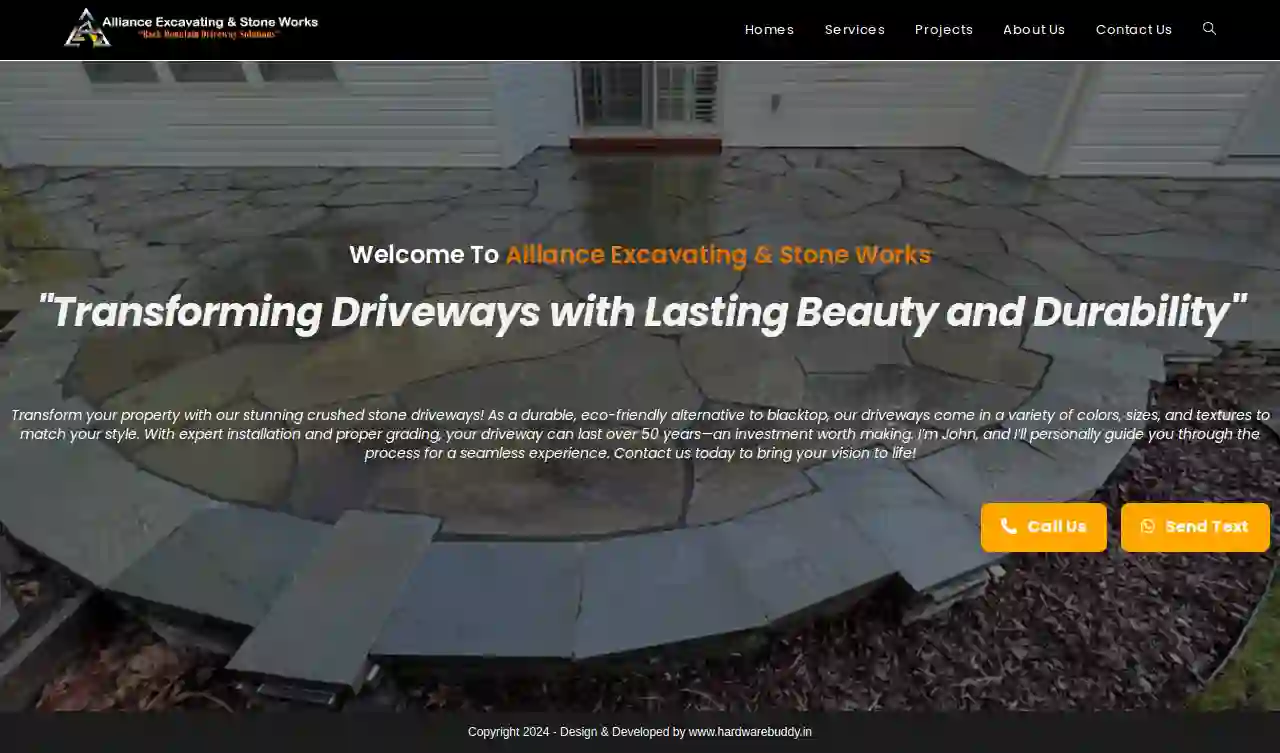
Alliance Excavating & Stone works
55 reviewsScranton, USWelcome To Alliance Excavating & Stone Works "Transforming Driveways with Lasting Beauty and Durability" Transform your property with our stunning crushed stone driveways! As a durable, eco-friendly alternative to blacktop, our driveways come in a variety of colors, sizes, and textures to match your style. With expert installation and proper grading, your driveway can last over 50 years—an investment worth making. I’m John, and I’ll personally guide you through the process for a seamless experience. Contact us today to bring your vision to life!
- Services
- Why Us?
- Gallery
Get Quote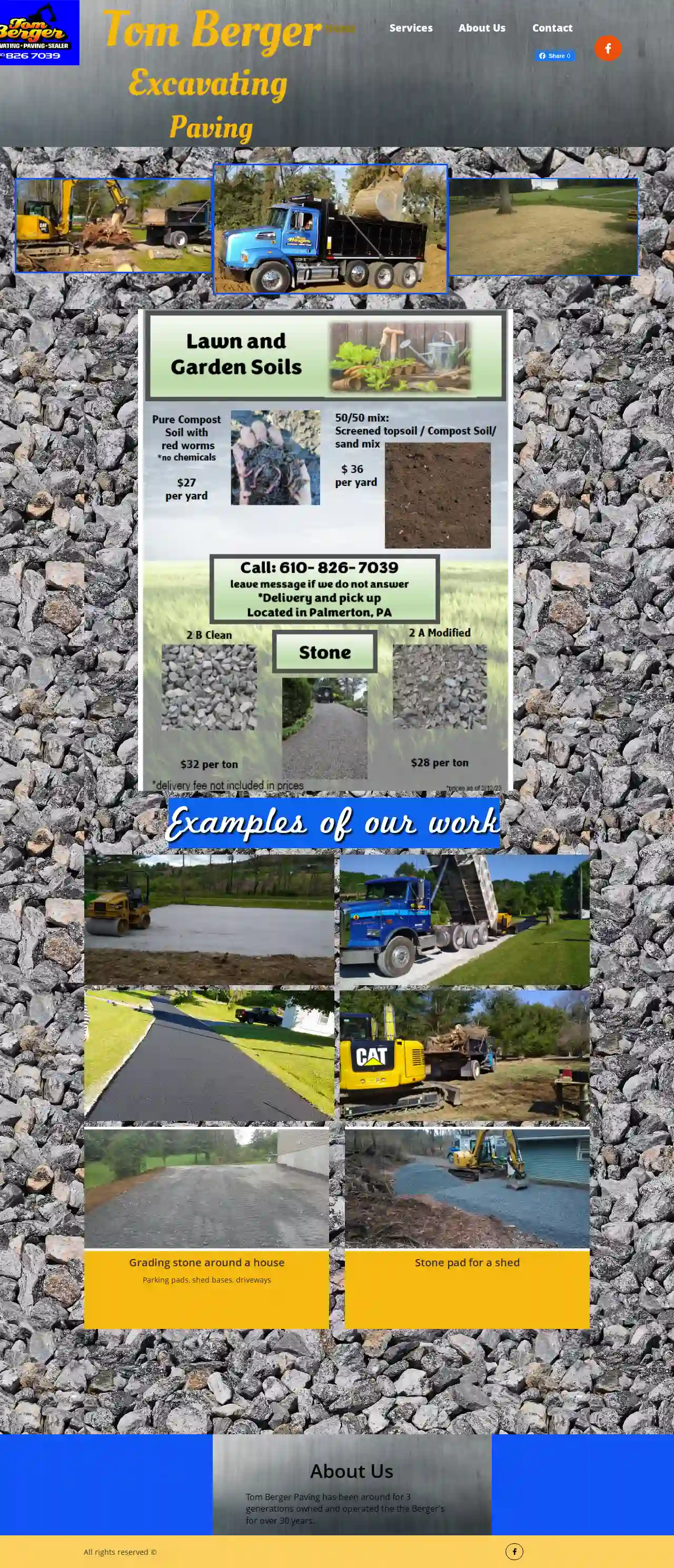
Tom Berger Excavating & Paving
51 reviews123 Main Street, CITY, 12345, USAbout Tom Berger Paving Tom Berger Paving is a family-owned and operated business with over 20 years of experience in the paving industry. We are committed to providing our clients with high-quality paving services at competitive prices. We specialize in a wide range of paving services, including asphalt paving, concrete paving, sealcoating, and crack repair. We also offer a variety of other services, such as driveway repair, parking lot maintenance, and snow removal. We are dedicated to providing our clients with the best possible service and are committed to exceeding their expectations. We are fully licensed and insured and offer free estimates on all of our services. We are proud to serve the [CITY] community and surrounding areas. We are committed to providing our clients with the best possible service and are dedicated to exceeding their expectations. We are fully licensed and insured and offer free estimates on all of our services.
- Services
- Why Us?
- Testimonials
Get Quote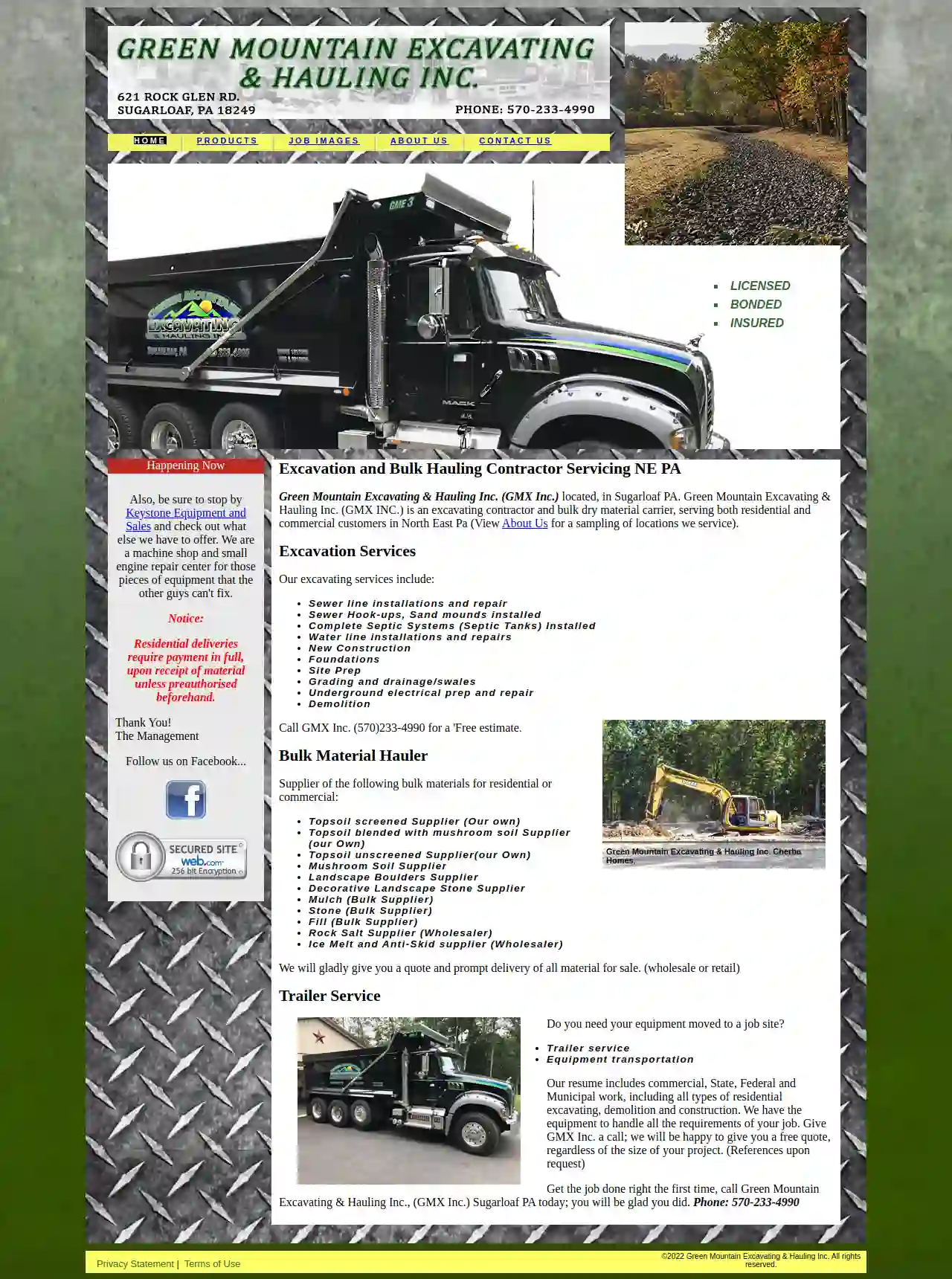
Green Mountain Excavating & Hauling Inc.
54 reviewsPO Box 841, Conyngham, 18219, USGreen Mountain Excavating & Hauling Inc. (GMX Inc.) Green Mountain Excavating & Hauling Inc. (GMX INC.) is an excavating contractor and bulk dry material carrier, serving both residential and commercial customers in North East Pa. We are a machine shop and small engine repair center for those pieces of equipment that the other guys can't fix. (View About Us for a sampling of locations we service). We are a licensed, bonded, and insured company. We are proud to offer a wide range of services to meet your needs. We are committed to providing our customers with the highest quality service at a fair price. We are also committed to safety and environmental responsibility. We are a family-owned and operated business with over 20 years of experience in the industry. We are dedicated to providing our customers with the best possible service. We are committed to providing our customers with the highest quality service at a fair price. We are also committed to safety and environmental responsibility. We are a family-owned and operated business with over 20 years of experience in the industry. We are dedicated to providing our customers with the best possible service.
- Services
- Why Us?
- Gallery
Get Quote- Ma
Mac's Excavation & Snow Removal
3.76 reviewsScranton, US- Services
- Why Us?
- Gallery
Get Quote
Over 3,943+ Excavation Contractors on our directory
Our excavation companies operate in Scranton and surrounding areas!
ExcavationHQ has curated and vetted the Best Excavation Pros arround Scranton. Find the most trustworthy pro today.
Frequently Asked Questions about Asbestos Removal
- Assessment: A qualified asbestos professional should assess the condition and location of the asbestos-containing materials.
- Management Plan: Develop an asbestos management plan outlining how the asbestos will be handled, including monitoring, maintenance, or removal if necessary.
- Communication: Inform employees and other building occupants about the presence of asbestos and any planned abatement activities.
- Compliance: Ensure compliance with relevant regulations and safety standards for asbestos management and abatement.
- Lung Cancer:
- Mesothelioma:
- Asbestosis:
- Pleural Plaques:
- Pleural Thickening:
- Pleural Effusion:
What should I do if I find asbestos in my workplace?
How long does it take to remove asbestos?
What are the health effects of asbestos exposure?
What is an asbestos survey?
What should I do if I find asbestos in my workplace?
- Assessment: A qualified asbestos professional should assess the condition and location of the asbestos-containing materials.
- Management Plan: Develop an asbestos management plan outlining how the asbestos will be handled, including monitoring, maintenance, or removal if necessary.
- Communication: Inform employees and other building occupants about the presence of asbestos and any planned abatement activities.
- Compliance: Ensure compliance with relevant regulations and safety standards for asbestos management and abatement.
How long does it take to remove asbestos?
What are the health effects of asbestos exposure?
- Lung Cancer:
- Mesothelioma:
- Asbestosis:
- Pleural Plaques:
- Pleural Thickening:
- Pleural Effusion: